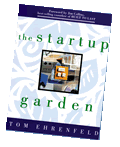
Answers from Jeffrey Fox On the terrific new business book blog Iíve posted a big tout for How to Make Big Money in Your Own Small Business: Unexpected Rules Every Small Business Owner Needs to Know by Jeffrey J. Fox. Q) Why, after five books on topics more geared to big business managers, do you turn your attention to small business? A) Small business is where the business action is, and where there is a dearth of street savvy advice. There are 25 million small businesses in the US (which represent 99% of all US companies), and there are 47million Americans who dream of having their own small business. Big audience. New businesses are most often started by people who have little to zero business experience or training. They need a readable, non-academic book (despite the fact that Harvard Business Review refuses to review my books because they are "non-academic"). The last recession has driven thousands of "upper management" folks out of big corporations and into their own small business. People who have worked in big corporations have no idea what it is like to run a hot dog stand, so they need this book. Q) What are the most important 2 or 3 principles that apply equally to small business people and to big company CEOs? 2) Dollarize the value of each product and service, and price to that value. Don't sell or advertise or communicate using adjectives: use numbers and express all benefits in dollars and cents. For example, instead of claiming "ABC lights use less electricity," say, "ABC lights use 38% less electricity generating $45 a week in extra cash for you." 3) Hire great people, and fire mediocre people. Q) Kudos on the formatóitís very easy reading, not for fluffy format, but for smart presentation. Why share the wisdom in 2-3 page sound bites? Q) We met when you commended a piece of mine trashing a handful of business books I disliked. Your turn. Name a couple business books you donít like, explaining why; and name a handful of business books you recommend enthusiastically. A) Business books I don't like: *Any book that should have a book jacket warning reading "dangerous to read while operating heavy machinery, such as running on a treadmill." Boring a reader to death is negligent homicide. *Seven Secrets of the whatever...is a huge best seller but is as readable as running thru the La Brea tar pits. *I'm not blown away by Who Cut The Cheese. Any book that spawns a cottage industry of people who give lectures explaining the "inner meaning" ain't for this philistine. Congrats to the author, however. *There is a new book out, written by a woman, giving tips to women on how to succeed in the corporation. It is dreadful. Business books I like: *On Ogilvy by the great David Ogilvy. The Unpublished Ogilvy is wonderful. *What They Don't Teach at the Harvard Business School is excellent. *The Peter Principle *Obvious Adams, which was an article in the Saturday evening Post in *Think and Grow Rich by Napoleon Hill. *In Search of Excellence is good because it tried to take the mystery out of running big organizations. And Tom Peters is a good guy. Posted by tom at May 18, 2004 11:36 AM |
Recent Writing Flow as the Grand Unifying Theory of Productivity Lowering the Personal Entrepreneurial Threshold Good Writing Begets Good Writing
THE BOOK
Read or print the Intro and
Read some book reviews at Inc, 1-800-CEO-READ, and the Miami Herald. Read the publisher's press release. Visit the companies that Tom discusses in the book Hear a recent lecture by Tom on the Startup Garden STARTUP RESOURCES Read about other books and web sites about starting your own business. TOM'S WRITING Just Managing – articles that Tom wrote for The Industry Standard and some Business Articles written for Inc., Fortune Small Business, Harvard Management Update, and other places. BUY THE BOOK To buy directly from me, simply go to Paypal and send 15 bucks to Tom@startupgarden.com. I'll take care of the rest. If you have any questions, email me at that address. |
| © 2001-2003 Tom Ehrenfeld | Site design by Tim Swan | |
